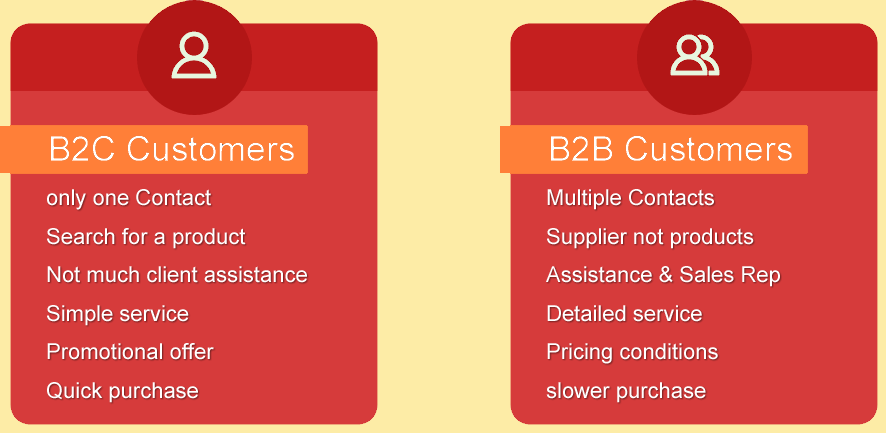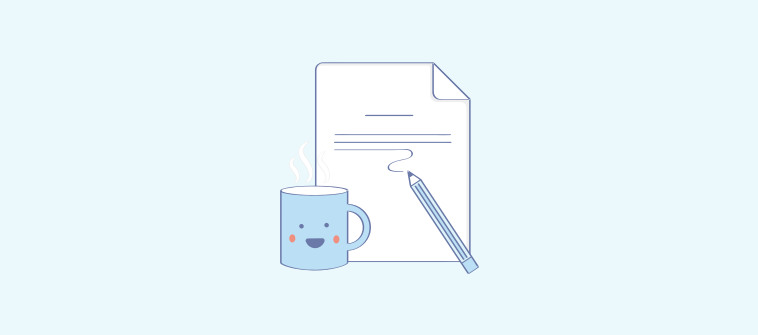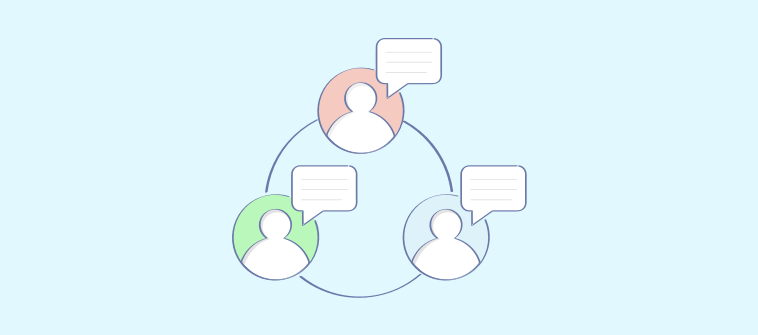
For every organization, customer support should be a top priority as it has the potential to make or break any business. When you respond to the queries of your customers on time and resolve their issues promptly, it yields a gratifying experience.
When the customers are happy with the services, your business is expected to witness a boom in terms of client retention and gain in new customers through word of mouth. So, you should pay extra attention to offering top-notch quality customer support. You can try out ProProfs Help Desk Software to manage customer requests effectively and to keep customer support on top.
Now, a question arises here: can you offer a similar type of customer support to all types of clients? No, you need to avoid the one-size-fits-all approach while providing customer support.
Every support team has to deal with two distinct types of customers B2B and B2C. B2b and B2c meaning are business-to-business and business-to-consumer, respectively. The former type of firm deals with businesses, and the latter type of company deals with end-users directly. The business model of both types of companies is different, their requirements are distinct, and their complaints would be different. Hence, you should strategize your customer support in such a way to gratify customers operating in both business type b2b and b2c.
Let’s understand what is b2b customer service and b2c customer service with an example:
In the case of a b2c company, end-users are the customers. They would have straightforward and non-technical queries like those related to exchange or return of a product. These kinds of issues can be resolved through the self-service help center or FAQ section. So, your agents don’t need to spend considerable time interacting with clientele as the resolution is quick. On the other hand, a b2b customer would turn to you regarding complex and technical issues. So, you need a dedicated team to offer b2b customer support.
What Is the Difference Between B2B and B2C Customer Service?
The nature of the business of b2b and b2c companies is entirely different from each other. They have different budgets, diverse expectations in terms of turnaround, and they deal with different kinds of clientele. The b2c companies deal directly with the end-users while b2b deals with suppliers and dealers. Hence, the requirements and issues faced by both types of businesses may vary. It is advisable to train your support reps to handle b2c and b2b customer relationship management differently.
According to Gartner, over two-thirds of companies believe that they compete on the basis of customer service. So, you should offer customized and best in class services to b2b and b2c customers to ace the competition
Let’s find out some significant differences between b2b and b2c customer service:
✔️ Impact on Revenues
B2B businesses deal with products and services that are sold to other businesses in a large volume. Hence, the interaction with a b2b customer has a significant impact on the revenues of the company.
When you interact with a b2c consumer, you are gratifying a single end-user at a time, and you may be able to sell your product/service to that consumer. This has a slight impact on the overall revenues. On the contrary, a b2b customer will purchase the product/service in large volumes and has a lifetime value greater than a b2c customer. If something goes wrong while dealing with b2b customers, it can cost you millions. That is why you should stress more on b2b customer relationship management. However, that doesn’t mean you can ignore b2c customers. You should handle both b2b and b2c customers appropriately and in a manner that is suitable for them.
Also, businesses must adopt innovative solutions to enhance customer interactions such as generating QR codes for easy access to information, promotions, and payments.
✔️ Contact Points
In the case of b2c companies, a single end-user or customer contacts your support team. So, you have to address an issue related to a single product/service purchased by a single customer. On the other hand, complaints from b2b businesses involve many clients. So, either a single person representing the entire clientele will contact your support team or multiple customers from the same company may contact you regarding the same issue.
The support agent should have access to tickets created by companies so that he/she can identify the cause of the issue and resolve it promptly. They should also be able to access the history of service requests so that they can offer personalized solutions.
✔️ Understanding of Customers
In case of dealing with b2c companies, different customers will approach your team for different/same queries. However, it’s difficult to maintain the same type of relationship with all the customers. The repeat rate of b2c customers is usually low.
In the case of b2b companies, you interact with different individuals from a company or a representative of the company. So, it becomes easy to understand the customer as a whole and to build a relationship. The sales cycle is longer in the case of b2b companies, and you have a better opportunity to develop knowledge of the customers. When you offer extraordinary customer support to a b2b company, you are retaining high-value customers.

B2B vs B2C Customer Support: How to Offer Ideal Customer Support
B2C Customers:
✔️ Quick resolution
In the case of b2c customer service, you need to offer support to an individual. You should strive to offer a good experience to the individual. According to a survey conducted by Forrester, 66% of adults say that valuing their time is the most significant thing that any company would do to enhance their customer experience.
So, you can value the time of your customers by resolving their queries promptly. You should train your service reps in such a way that they deal with customer requests in a timely manner. The agents should try to resolve the issue in a single reply as that would lead to enhanced customer satisfaction.
✔️ Personalized solutions
Everyone likes to gain importance, and personalization can make your customers feel special. For this, the agents should be able to track the history of customer complaints to offer a personalized solution. Providing utmost care to customers gratifies them. This may even be beneficial for your business in terms of gaining more customers. As per stats given by Temkin Group, 77% of customers would recommend a brand to their peers after experiencing good customer support.
✔️ Mobility
The modern-day customers yearn to perform most of their tasks on the go. In such a scenario, if they are able to resolve their issues on the move, then that would surely yield them a gratifying experience.
As per American Express, every six in 10 U.S consumers believe that they prefer self-service channels for simple inquiries. These include a mobile app, website, voice response system, or online chat.
You can offer mobile-friendly options like social media contact points and live chat with the customers. So, your customers will find it easy to make a complaint from their mobile device. A company that is accessible via smartphones tends to be more desirable among b2c customers. It also empowers your support team as they can reply to customer queries from their mobile phones.
✔️ Social contact points
This is a generation of socially-active people. Customers these days are very vocal and don’t take a minute to share their experiences online. So, you can leverage social channels to create amazing experiences for b2c customers. You can make your business visible on social channels so that customers can reach out to you with their queries.
You can update your social accounts with a knowledge base where customers can find answers to most of the general questions. In this way, you can gratify your social-savvy customers. You can also train your service reps to check your social accounts for any service request and resolve them on time.
B2B Customers:
✔️ Dedicated support
In the case of b2b customer service, you deal with a company. It is clear that b2b customers have a significantly higher value than b2c customers. Losing a single b2b client implies a major loss for the company. So, you need to offer them extraordinary services. You should strive to provide well-tailored and more in-depth support as it is about building long-lasting relationships.
The best way to gratify b2b customers is to offer a dedicated team or account manager who can assist them from time to time. The account manager should understand the needs of customers and foster a healthy relationship with the customer.
✔️ Applications, email support and live chat
In addition to on-the-move methods of communications like live chats and video conferencing, b2b businesses also prefer traditional methods such as email support as it is considered as an authentic method of communication among businesses. B2b companies also look for web applications that can be integrated with their existing systems. In this way, businesses can place complaints on the go; keep track of their complaints, and get it resolved on time.
Closing Note
Top-notch customer support is integral to the success of every organization. However, you cannot follow a one-size-fits-all approach to handle all kinds of service requests. You deal with b2b and b2c companies having different types of requirements, so you should offer unique customer support to every kind of business.
B2C agents will always connect with the individual who has to take the decision, so you should focus on gratifying the individual. Your service rep can offer personalized support to customers and resolve the query quickly. On the other hand, you might not be able to contact the decision-maker of the b2b company. You may even have to interact with different people from the same company.
The expectations of b2b companies are high as they spend more. Hence, you should spend considerable time interacting with them, understand their pain points, and offering the best solution. You should have a dedicated team for b2b companies that can provide them personalized solutions and maintain a strong long-term relationship.
FAQs:
Q. How b2b is different from b2c?
B2b refers to communication/sales between business and business, whereas B2c refers to interaction/sales between business and individual customers.
Q. How are the b2b and b2c buying processes different?
(i) B2b buying processes are for other businesses that involve commercial aspects, team decisions, detailed discussions, and constant analysis.
(ii) B2c buying processes are for individual customers, which is a shorter process and is based on emotions and situations of the customer.
Q. Is b2b harder than b2c?
B2b is a bit more complicated than B2c because it involves dealing with large organizations, interaction with separate teams, constant analysis, and higher stakes.
Q. Can a company be both b2b and b2c?
It depends on the business type and the business goals of the business owner. For instance, a leather manufacturing unit can be both B2b and B2c by offering leather to other shoe manufacturers and by selling shoes and handbags to individual customers.
 Tips
Tips
We’d love to hear your tips & suggestions on this article!
FREE. All Features. FOREVER!
Try our Forever FREE account with all premium features!

 We'd love your feedback!
We'd love your feedback! Thanks for your feedback!
Thanks for your feedback!







